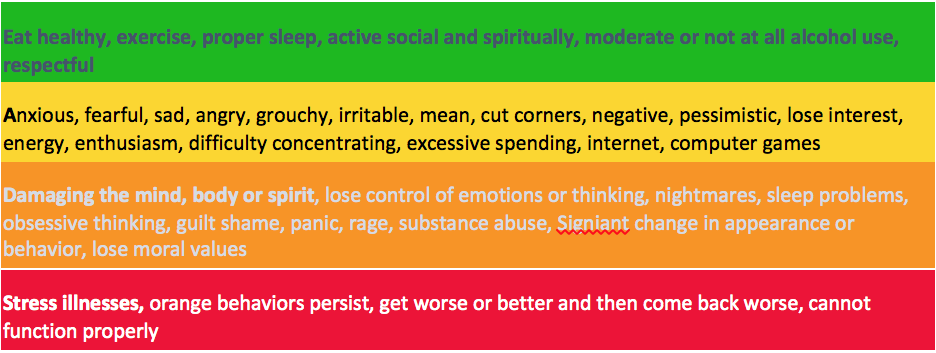Combating Stress Using the Stress Continuum*
Although your inner distress is normal, it is important to keep in mind stress can fluctuate over time. The key to combating stress is not to avoid stress but not to expect to jump in and solve all your problems either. When you are in pain, it may feel as if avoiding the pain is worthwhile. Avoiding stress however, keeps you from timely resources that can help you alleviate the stress. Here are a few steps to combating stress.
Uncertainty involves stress. Simply planning and accepting are active ways of coping. Do your best to maintain a scheduling system for walking, exercise, eating, sleeping, diet, medications, daily task completion, and education. Remember important things such as relationship interaction and involvement. Schedule time to relax—continuous stress can cause the brain and the body to become overloaded. Value your own expectations in terms of time, energy and financial use and resources.
When people feel trapped in their stress it’s difficult to understand other people. As difficult as it is, remember that you don’t have control over other people. Constant worry over other people can be stressful for both you and others. Ask for help when you are having difficulty with your behavior or understanding other people’s behaviors.
Social support is the sharing of resources and communication between two or more people for mutual benefit. Just knowing family, friends and community are willing to show support can be a huge relief and can be vital in a crisis. Use family, friends, church and social service support wisely. It is difficult to determine what level of involvement to have with others. Relationships are not always supportive; they can involve intense expectations, demands, responsibility, tasks, finances, intelligence, energy and skills. The better your relationships are the more likely you will be better at caring for yourself. Make your best choice, without blaming yourself or others, while understanding that a lot of things are outside of your control.
Psychotherapy can help provide a time for you to determine a realistic way to deal with stress and the emotions that come with it. It can also teach you to be supportive of yourself and others, learn the difference between reactions from the past and what is going on in the present and help with mastering future social challenges. Connecting with community resources can help with the specific problems you are experiencing and can be vital to change. Learning about the reason behind our behavior issues can help in manage stress.
*Adapted from Naval Center for Combat and Operational Stress Control



Add Comment